Construction projects often go wrong due to poor planning and preparation
Before starting your construction project
Proper planning before starting construction will yield dividendsRushed or poor planning at the start of a construction project often results in problems later in the construction project. Good planning helps reduce costs, avoid mistakes, and even reduces the construction time. Please like, share and comment. This article is from information in the author's book: 'Successful Construction Project Management, The Practical guide'. Find out more about this book Do you want to learn how to manage construction projects successfully?Paul Netscher has written several easy to read books for owners, contractors, construction managers, construction supervisors and foremen. They cover all aspects of construction management and are filled with tips and insights.
The books are available in paper and ebook from most online stores including Amazon. © 2020 This article is not to be reproduced for commercial purposes without written permission from the author.
7 Comments
Every construction project generates huge amounts of construction rubbish. The cost of disposing of construction rubbish includes the cost of loading it, transport to the dump, as well as the tip fees. These costs can be huge on the average construction project. In an effort to reduce these costs some contractors resort to dumping the rubbish illegally on vacant lots, which could result in monetary fines and bad publicity, as well as incurring the costs to clean up the mess when they’re reported to the authorities. This is environmentally insensitive – would you want some contractor dumping construction waste in your neighbourhood, would you want your rates and taxes used to clean up someone else’s rubbish? Anyway, some construction waste is dangerous. Asbestos could blow into neighbouring properties, kids could be cut on broken glass and ceramic tiles, and farm animals could choke and die from ingesting plastic, all of which could lead to legal action against the offending contractor. Other contractors choose to bury construction rubbish on the project site. This is also illegal and will upset clients should they uncover the rubble while they’re landscaping their property or building other structures. Indeed they’re entitled to call the offending contractor back to clean up the mess, or they could deduct the clean-up costs from the contractor’s retainage money or their bonds. Some rubbish, such as paints, oils, and asbestos, must be disposed of correctly in special locations. Mixing these materials with the general waste on the project will contaminate all the rubbish, requiring all the material that is now contaminated to be disposed in special locations at additional costs. Construction waste could include packaging from construction materials (including cans, plastic, pallets, timber, strappings and polystyrene), damaged materials which can’t be used, defective work that had to be demolished, broken materials, offcuts, excess materials, materials which were mixed and went hard before they could be used, vegetation which was stripped from the project site, topsoil, unsuitable ground and rock, excess ground from excavations, rubble from existing structures which had to be demolished, as well as the usual trash from workers, such as food wrappers, cans and more. Avoid costs by reducing construction waste with these 14 tips:
Look around your construction projectAlways designate specific areas for construction rubbish and ensure that papers don’t blow around the site or into neighbours’ properties or block drains. Check that subcontractor clear their construction rubbish. Get everyone on your project onboard to eliminate unnecessary waste. Have a look in your project’s skip waste bins and rubbish piles. You might be shocked at what you see. There could be several hundred dollars of good materials and equipment being thrown away. Consider how you could reduce the amount of waste. How can you save money on your project and improve the environment by managing the waste on your construction project better? How much trash will your project send to the dump? This article was first published on the ClockShark website. Please like, comment and share this post. Do you want to learn how to manage construction projects successfully?Paul Netscher has written several easy to read books for owners, contractors, construction managers, construction supervisors and foremen. They cover all aspects of construction management and are filled with tips and insights.
The books are available in paper and ebook from most online stores including Amazon. © 2019 This article is not to be reproduced for commercial purposes without written permission from the author. Building Information Modeling is the process by which the AEC industry is accommodating a digital revolution for its different stakeholders. Advancements of BIM services have brought about effective collaboration throughout the entire project lifecycle, leaving behind the traditional communication method for a more improvised and channelled communication online. When we talk about effective project management while a construction project is undertaken, it is BIM technology in current times which is bringing about the effective changes. Some noteworthy aspects to be considered are:
So with this, we can conclude that the BIM project management solution got every party like managers, designers, contractors etc. under one umbrella by integrating their functionalities bringing about a win-win situation for everyone. Having information sharing an integrated intelligent model arises which facilitates the entire project lifecycle, bringing about the success in the Project Delivery Plan too. About the blog sponsor/Author: ASC Technology Solutions ASC Technology Solutions is a leading BIM outsourcing company in India. They cater to the Architecture, Engineering, and Construction Industry. Website URL: www.asctechno.com Please like share or comment Do you want to learn how to manage construction projects successfully?Paul Netscher has written several easy to read books for owners, contractors, construction managers, construction supervisors and foremen. They cover all aspects of construction management and are filled with tips and insights.
The books are available in paper and ebook from most online stores including Amazon. Submitting a variation claim is not a dispute. A dispute arises when the contractor and the client cannot agree that the variation claim is legitimate, or they cannot agree the quantum of the claim. Disputes also arises when one of the parties believes that the other party has acted unfairly or they have been prejudiced in some way. Why construction disputes are bad Disputes are bad because:
Avoiding construction disputesTo avoid disputes:
But disputes can be avoided if:
Understand your contract documentWhen disputes are unavoidable the contract document could dictate the procedure to follow. The document will normally also stipulate the country where disputes should be resolved and the law to be followed. Make sure you understand these procedures before declaring a dispute. Litigation under foreign law and in another country can be vary complicated and costly. Want to learn more about construction claims? 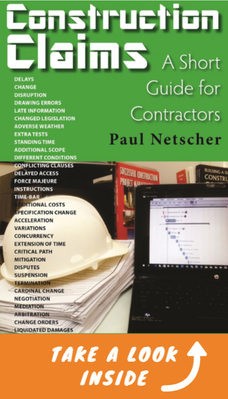 "All 120 projects I’ve been involved with included Variation Claims – some for millions of dollars. Some projects doubled in value! Yet, 99% of claims were settled amicably and most of what we claimed was approved. More importantly we completed further projects with these clients.” Paul Netscher. Construction Claims: A Short Guide for Contractors, written by Paul Netscher is an easy to read simplified guide that gives an overview to construction claims. "An excellent, concise and very practical guide to successful claims process. This is a no nonsense approach that gets on with it. Packed full of valuable advice for both sides - contractor and employer. 'Short' in the title should not be mistaken for lack of valuable content - this is a cracking book. I also have the authors other books which are equally good. Highly recommended." (Reader Amazon UK) ***** "Objective with very clear text, demonstrating full knowledge of the reality during construction's works." (Reader Amazon.com) ***** |
Archives
June 2024
Note: We welcome genuine comments, especially comments that add additional information to the subject matter in the article. We however reserve the right to remove inappropriate comments, which includes comments that have nothing to do with the subject, comments that include inappropriate language, and comments that are an advertisement for a product or company, or which include an advertising link. Comments must be in English. We will not enter into discussion on why a particular comment was removed.
CategoriesCopyright 2016 - The attached articles cannot be reproduced for commercial purposes without the consent of the author.
The opinions expressed in the attached articles are those of the writer. It should be noted that projects are varied and different laws and restrictions apply which depend on the location of the contractor and the project. It's important that the reader uses the supplied information taking cognisance of their particular circumstances. The writer assumes no responsibility or liability for any loss of any kind arising from the reader using the information or advice contained herein. "I have what I consider some of the best books on construction management."
Books are available from: Amazon.com Amazon.co.uk takealot.com kalahari.com Amazon.in Amazon.de Amazon.fr Amazon.it Amazon.com.au Powell's Fishpond uread bokus Amazon.ca Amazon.es Other retail stores Available in paperback or on Kindle "28 YEARS OF CONSTRUCTION PROJECT MANAGEMENT EXPERIENCE, DEVELOPING SUCCESSFUL CONSTRUCTION PROJECT MANAGERS AND BUILDING SUCCESSFUL CONSTRUCTION COMPANIES"
|
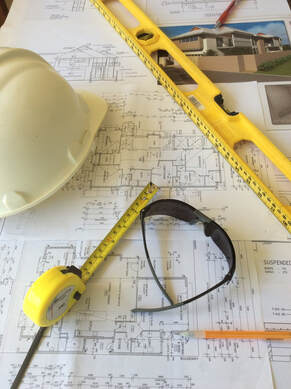

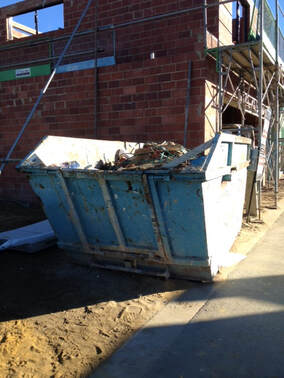
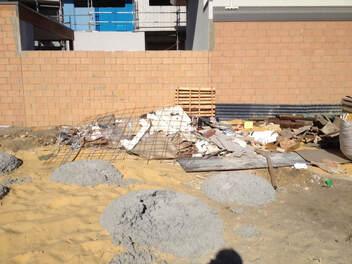

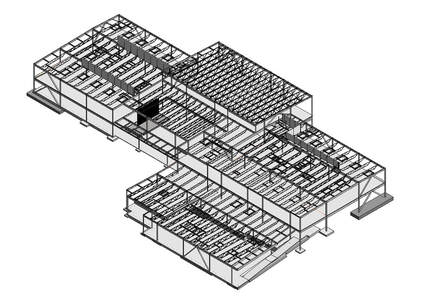

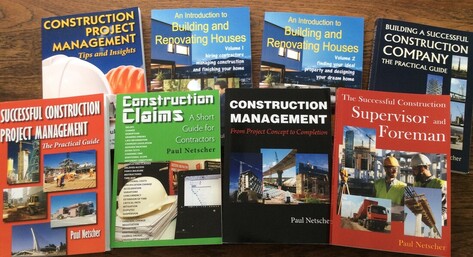




 RSS Feed
RSS Feed




